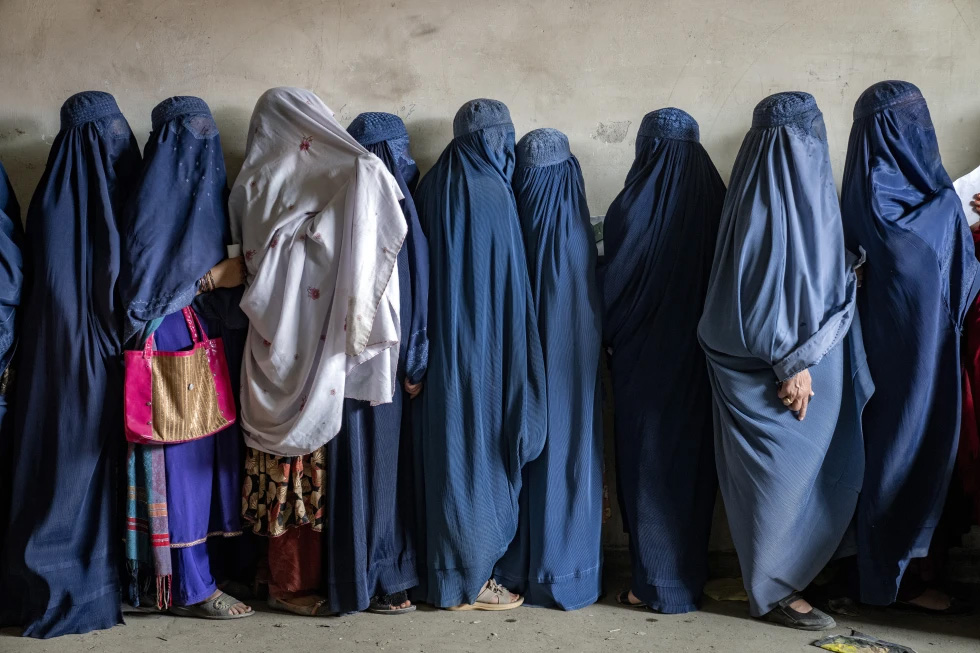The Taliban’s Morality Police Law and the Gradual death of Women – Part 2
Published on Tuesday, September 4th, 2024
Written by Rahim Rostayee

Introduction
“The Taliban’s Ministry of Justice has formally published its new ‘Promotion of Virtue and Prevention of Vice’ law, signed into effect by their supreme leader, Hibatullah Akhundzada in the official journal number 1452, July 31, 2024. This 35-article law, divided into four chapters imposes sweeping restrictions, especially on Afghan women. While the law outlines general guidelines for both men and women and specific roles for the morality police, the chapter dedicated to women has sparked global outrage. The question now is: what specific limitations has this new law placed on the lives of Afghan women?”
1. Prohibition of unnecessary leaving the house: Article 13, section 8, once again emphasizes the obligation for adult women to cover their faces, bodies, and voices when leaving their homes for necessary purposes: ‘Whenever an adult woman goes out of her house for a necessary need, she is obligated to conceal her face, body, and voice.
2. Prohibition of traveling without Muharram: “Articles 20, sections 3 and 5, further empower the morality police to prevent drivers from transporting women who are not fully covered or who are not accompanied by a male chaperone. The law explicitly states: ‘They are obligated to prevent the transportation of unveiled women and to avoid transporting adult women without a male guardian.’ What harsher punishment can there be for women? Especially considering that a significant number of women in Afghanistan do not have male guardians or have lost their husbands in the war. According to Jamhor News reports, there are 600,000 widows in Afghanistan. How are these women supposed to seek medical treatment or buy groceries without access to transportation?
3. Prohibition of mixing men and women: The Taliban have issued a new edict prohibiting women from sitting next to men in vehicles or any other public setting. The morality police have been tasked with enforcing this rule, compelling drivers to separate male and female passengers. Article 20, section 4, explicitly states: ‘They are obligated to prevent women from sitting or mixing with unrelated men.’ Under this decree, women are effectively barred from any social interaction with men, even to the extent of being prohibited from sitting near them. It’s as if women are being sentenced to solitary confinement.”
4. Prohibition of socializing and non-verbal relationships with men: “Not only are women denied the right to engage in sexual relationships, but they are also prohibited from having any form of social or emotional connection with men. Article 21 explicitly states this, and the morality police are tasked with preventing men from committing adultery, nikah mut’ah (temporary marriage), or philandering. The implication is clear: Women and girls are forbidden from romantic relationships.
5. Prohibition of lesbianism (female homosexuality): “While homosexuality and transgender identity are recognized as rights in many countries today, the Taliban’s morality laws not only deny these rights but also severely punish those who identify as such. The morality police are mandated to crack down on these behaviors, which are considered criminal offenses. Article 22, section 3, specifically tasks the morality police with preventing ‘lesbianism,’ which is defined as same-sex attraction among women. It’s striking how much emphasis is placed on prohibiting lesbianism compared to the relatively little attention given to male homosexuality.
6. Prohibition of performing music and concerts by women: “Women are even prohibited from performing music or concerts outside their homes. Article 22, section 10 declares that a woman’s voice or music being heard outside a home or gathering’ is forbidden and illegal.
The implications of this ruling could be devastating for Afghanistan’s culture and arts.
Discussion and Conclusion
“The Taliban’s ‘Promotion of Virtue and Prevention of Vice’ law, rooted in a strict interpretation of Sharia and primarily based on Hanafi jurisprudence, is a cornerstone of the Emirate’s legal system. While ostensibly designed to maintain social order and promote Islamic morality, this law not only fails to contribute to social harmony but also confines a significant portion of the population, particularly women, to a life of severe restrictions. By mandating the burqa, denying women the right to work and education, and enforcing gender segregation in public spaces. Consequently, this law faces numerous challenges and has far-reaching implications, including:
Challenges:
This law faces several major challenges:
1. The primary source for this law is Hanafi jurisprudence. However, Afghanistan is home to numerous followers of other Islamic sects, such as Ja’fari, Ismaili, Maliki, Hanbali, and Shafi’i. Enacting a law based solely on one specific sect amounts to religious sectarianism, imposing one sect on followers of other sects, and suppressing freedom of thought and religion.
2. Strict interpretations of specific verses or hadiths by individuals should never be imposed as law upon the entire population of Afghanistan.
3. The law contains numerous contradictory statements and articles. For instance, section two of article six promotes peace, brotherhood, and the rejection of ethnic, linguistic, and regional prejudices, while many other articles directly contradict this principle. Similarly, section seven of article ten emphasizes justice and impartiality, yet numerous provisions within the law contravene these principles.
4. The vast majority of the articles in this law are in direct violation of human rights principles. They explicitly infringe upon human dignity, individual and social freedoms, justice, equality, and the rights of minorities.
5.The punishments stipulated in this law, such as flogging, imprisonment, and execution, are fundamentally at odds with democratic principles and human rights values.
Consequences:
The enactment and enforcement of the Taliban’s ‘Promotion of Virtue and Prevention of Vice’ law has had, and continues to have, far-reaching domestic and international consequences. These include:
1. The international community has widely condemned this law and called for its repeal. The global backlash against this legislation has further isolated Afghanistan and inflicted significant harm on the Afghan people.
2. The implementation of this law, coupled with the Taliban’s misogynistic decrees such as the closure of schools, bans on women’s employment and movement, and restricted access to healthcare, has led to widespread unemployment, poverty, and increased mortality rates among women.
3. The surge in unemployment, poverty, repression, and deprivation experienced by women as a result of the Taliban’s policies has led to a significant increase in mental health issues. Experts warn that the continuation of these policies could create a deeply troubled society in Afghanistan.
4. Far from promoting or reviving Sharia and moral values, this law has undermined social and economic development, increased public discontent, and fueled social resentment towards religion.
In conclusion, the Taliban’s ‘Promotion of Virtue and Prevention of Vice’ law, in addition to its content conflicts, has led to increased poverty, unemployment, mental health issues, social repression, the marginalization and suffering of women, religious disaffection, human rights abuses, and the political isolation of Afghanistan.
